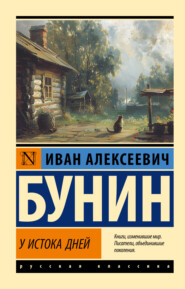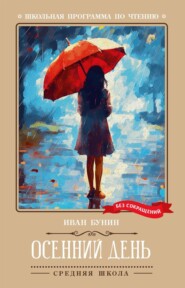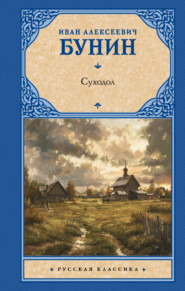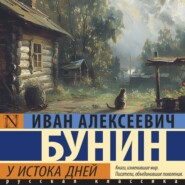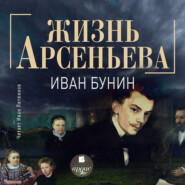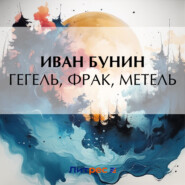По всем вопросам обращайтесь на: info@litportal.ru
(©) 2003-2025.
✖
Dark Avenues / Темные аллеи. Книга для чтения на английском языке
Настройки чтения
Размер шрифта
Высота строк
Поля
“I couldn’t eat dinner at all,” she said. “I didn’t think I could sustain this dreadful role through to the end. And I’m terribly thirsty. Give me some Narzan[16 - Narzan: Mineral water from the Caucasus. (прим. перев.)], dear,” she said, addressing me intimately for the first the Caucasus time. “I’m convinced he’ll come after me. I gave him two addresses, Gelendzhik and Gagry. Well, and in three or four days he’ll be in Gelendzhik… But who cares, better death than this torment…”
* * *
In the morning, when I went out into the corridor, it was sunny and stuffy; from the toilets came the smell of soap, eau de cologne and everything a carriage full of people smells of in the morning. Passing outside the windows, heated up and dull with dust, was the level, scorched steppe, dusty wide roads could be seen, and carts drawn by bullocks, there were glimpses of trackmen’s huts with the canary-yellow circles of sunflowers and scarlet hollyhocks in the front gardens… Further on there began the boundless expanse of bare plains with barrows and burial grounds, the unendurable dry sun, the sky resembling a dusty cloud, then the spectres of the first mountains on the horizon…
* * *
From both Gelendzhik and Gagry she sent him a postcard and wrote that she did not yet know where she would stay.
Then we went down along the coast towards the south.
* * *
We found a primeval place, overgrown with forests of plane trees, flowering shrubs, mahogany, magnolias and pomegranate trees, among which there rose fan palms and the cypresses showed black…
I would wake up early and, while she slept, before tea, which we drank around seven o’clock, walk over the hills to the woodland thickets. The hot sun was already strong, clear and joyous. In the woods the fragrant azure mist was shining, dispersing and melting away, beyond the distant wooded summits gleamed the everlasting whiteness of the snowy mountains… I would go back through our village’s sultry marketplace with its smell of pressed dung[17 - pressed dung – кизяк (высушенный или переработанный навоз, используемый в качестве топлива)] burning from the chimneys; trade was seething there, it was crowded with people, saddle horses and donkeys – a multitude of mountaineers of different races assembled there at the market in the mornings – Circassian girls floated about in long, black clothes down to the ground and red slippers, with their heads enfolded in something black, and with quick, birdlike glances flashing at times from that funereal enfoldment.
Later we would leave for the seashore, always completely deserted, bathe and lie in the sun right up until lunch. After lunch – always panfried fish, white wine, nuts and fruit – in the sultry twilight of our hut, under its tiled roof, hot, gay strips of light reached through the slatted shutters.
When the heat abated and we opened the window, the part of the sea that was visible from it between the cypresses standing on the slope below us had the colour of violets and lay so flat and peaceful that it seemed there would never be an end to this tranquillity, to this beauty.
At sunset, amazing clouds often piled up beyond the sea; their glow was so magnificent that at times she would lie down on the ottoman, cover her face with a gauze scarf and cry: another two or three weeks – and Moscow again!
The nights were warm and impenetrable, in the black darkness fireflies floated, twinkled, shone with a topaz light, tree frogs clanked like little glass bells. When the eye grew accustomed[18 - to grow accustomed – привыкнуть] to the dark, the stars and the crests of the mountains stood out on high, and above the village were the outlines of trees that we did not notice in the daytime. And all night, from there, from the inn, could be heard the muffled banging of a drum and the throaty, doleful, hopelessly happy wailing of what always seemed to be one and the same endless song.
Not far from us, in a coastal ravine descending out of the wood to the sea, a shallow, limpid little river leapt quickly along its stony bed. How wonderfully its lustre rippled, seethed, at that mysterious hour when, like some marvellous creature, the late moon looked out intently from behind the mountains and the woods.
Sometimes during the night, terrifying clouds would approach from the mountains; there would be an angry storm; in the noisy, sepulchral blackness of the woods, magical green abysses were continually gaping open, and cracking out in the heavenly heights there were antediluvian claps of thunder. Then in the woods eaglets would wake up and mew, the snow leopard would roar, the jackals would yelp… Once a whole pack of them came running to our lighted window – on such nights they always congregate around dwellings – we opened the window and looked at them from above, and they stood in the gleaming torrent of rain and yelped, asking to come in… She cried for joy, looking at them.
* * *
He searched for her in Gelendzhik, in Gagry, in Sochi. The day after his arrival in Sochi, he bathed in the sea in the morning, then shaved, put on clean linen, a snow-white tunic, had lunch at his hotel on the terrace of the restaurant, drank a bottle of champagne, had coffee with chartreuse[19 - coffee with chartreuse – кофе с шартрезом (Шартрез – название французского ликера)], unhurriedly smoked a cigar. Returning to his room, he lay down on the couch and shot himself in the temples with two revolvers.
12th November 1937
A Ballad
On the eve of the big winter holidays the country house was always heated up like a bathhouse and presented a strange picture, for it consisted of spacious and low rooms, the doors of which were all wide open throughout – from the entrance hall to the divan room, situated at the very end of the house – and its red corners[20 - red corners: The name given to the corner of a room where the icons hang. (прим. перев.)] gleamed with wax candles and lamps in front of the icons.
On the eve of those holidays, they washed the smooth oak floors – which soon dried out from the heating – everywhere in the house, and then carpeted them with clean rugs; they set out in their places in the very best order the furnishings that had been moved aside for the period of work, and in the corners, in front of the gilded and silver settings of the icons, they lit the lamps and the candles and extinguished all other lights. By this time the winter night was already darkly blue outside the windows and everyone dispersed to their own sleeping quarters. Complete quiet was then established in the house, a peace that was reverential and seemingly waiting for something, and which could not have been more in keeping with the sacred nocturnal appearance of the mournfully and touchingly illumined icons.
In the winter the wandering pilgrim Mashenka was sometimes a guest on the estate, grey-haired, withered and tiny, like a little girl. And it was just she alone in all the house who did not sleep on such nights: arriving in the hallway from the servants’ quarters after supper and removing the felt boots[21 - felt boots – валенки] from her little, woollen-stockinged feet, she would go noiselessly over the soft rugs through all those hot, mysteriously lit rooms, kneel down everywhere, cross herself, bow down before the icons, and then go back to the hallway, sit down on the black chest that had stood in it from time immemorial, and in a low voice recite prayers, psalms, or else simply talk to herself. It was thus I found out one day about this “beast of God, the Lord’s wolf”: I heard Mashenka praying to him.
I could not sleep, and I went out late at night into the reception hall to go through to the divan room and there get something to read from the bookcases. Mashenka did not hear me. She was sitting saying something in the dark hallway. Pausing, I listened closely. She was reciting psalms from memory.
“Hear my prayer, O Lord, and give ear unto my cry,” she said, without any expression. “Hold not thy peace at my tears, for I am a stranger with thee, and a sojourner on the earth, like all my fathers were…[22 - Hear my prayer… my fathers were: Psalms 39:12 (slightly inaccurate: the phrase “on the earth” has been added). (прим. перев.)]
“Say unto God: how terrible art thou in thy works![23 - Say unto God… thy works: Psalms 66:3. (прим. перев.)]
“He that dwelleth in the secret place of the most High shall abide under the shadow of the Almighty… Thou shalt tread upon the lion and adder, the young lion and the dragon shalt thou trample under foot…”[24 - He that dwelleth… trample under foot: Psalms 91:1, 13. (прим. перев.) Живущий под кровом всевышнего под сенью всемогущего покоится… На аспида и василиска наступишь, попрешь льва и дракона…]
At the last words she quietly but firmly raised her voice and pronounced them with conviction: trample upon the lion and the dragon. Then she paused and, after slowly sighing, spoke thus, as if conversing with somebody:
“For every beast of the forest is his, and the cattle upon a thousand hills…”[25 - For every beast… on a thousand hills: Psalms 50:10 (slightly inaccurate: the word “his” replacing “mine”). (прим. перев.)]
I peeped into the hallway: she was sitting on the chest with her little, woollen-stockinged feet hanging down from it evenly and holding her arms crossed at her breast. She was looking straight ahead, not seeing me. Then she raised her eyes to the ceiling and uttered distinctly:
“And thou, beast of God, the Lord’s wolf, pray for us to the Queen of Heaven.”
I approached and said softly:
“Mashenka, don’t be afraid, it’s me.”
She let her arms drop, stood up, gave a low bow:
“Hello, sir. No, sir, I’m not afraid. What have I got to be afraid of now? It was in my youth I was silly, afraid of everything. The dark-eyed demon troubled me.”
“Please sit down,” I said.
“No, sir,” she replied. “I’ll stand, sir.”
I put my hand on her bony little shoulder with its big collarbone, made her sit down, and then sat down next to her:
“Sit still, or else I’ll leave. Tell me, who was it you were praying to? Is there really such a holy one – the Lord’s wolf?”
Again she tried to get up. Again I restrained her:
“Ah, just look at you! And there you are, saying you’re not afraid of anything! I’m asking you: is it true that there’s such a holy one?”
She had a think. Then she replied seriously:
“There must be, sir. There is the beast Tiger-Euphrates,[26 - Tiger-Euphrates: The Russian word for the river Tigris is the same as the word for “tiger”. (прим. перев.) Тигр и Евфрат – названия двух основных рек Месопотамии и Ближнего Востока.] after all. And if it’s painted in a church, there must be. I saw it myself, sir.”
“How do you mean, you saw it? Where? When?”
“Long ago, sir, in a time beyond memory. And where – I can’t even say: I remember one thing – we were travelling there three days. There was a village there, Krutiye Gory. I’m from far away myself – perhaps you’re so good as to have heard of the place: Ryazan – and those parts would be even further down, beyond the Don, and what a rough place it is there, you couldn’t even find the words. It was there our prince had his main village, his grandfather’s favourite – maybe a full thousand clay huts on bare mounds and slopes, and on the very highest hill, on its crown, above the Kamennaya River, the masters’ house, all bare too, three-tiered, and a yellow church with columns, and in that church this here God’s wolf: in the middle, then, there’s a cast-iron slab over the tomb of the prince it slaughtered, and on the right-hand pillar – the creature itself, this wolf, painted at its full height and size: it sits in a grey fur coat on a thick tail, and its whole body’s reaching up, with its front paws resting on the ground – and its eyes just boring into yours: a grey fur collar, long-haired and thick, a large head, sharp-eared, its fangs bared, furious, bloodshot eyes, and around its head a gold aureole, like saints and holy men have. It’s terrible just remembering such a wondrous marvel! It’s so lifelike sitting there, looking as if it’ll rush upon you at any moment!”
“Wait, Mashenka,” I said, “I don’t understand a thing: who painted this terrible wolf in the church and why? You say it slaughtered a prince – so then why is it holy, and why should it be over the prince’s tomb? And how did you find yourself there, in that dreadful village? Tell me everything clearly.”
And Mashenka began telling her story:
“I found myself there, sir, for the reason that I was then a serf girl, serving in our prince’s house. I was an orphan, my father, so they had it, was some sort of man passing through – a runaway, most likely – he seduced my mother unlawfully and disappeared God knows where, and mother, soon after giving birth to me, she passed away. Well, so the master took pity on me, took me from the menials into the house as soon as I hit thirteen, and put me at the beck and call[27 - (to be) at smb’s beck and call – (быть) всецело в чьем-либо распоряжении; на побегушках] of the young mistress, and for some reason I so took her fancy she wouldn’t let me out of her favour for any time at all. And it was she that took me on the voyage with her when the young prince got the idea of taking a trip with her to his grandfather’s legacy, to that there main village, to Krutiye Gory. That estate had been long neglected, deserted – the house had just stood boarded up, desolate, ever since the grandfather’s death – well, and our young master and mistress thought they’d like to visit it. But what a terrible death the grandfather had died, we all knew about that from legend…”
In the reception hall something gave a slight crack, then fell with a little thud. Mashenka threw her legs down from the chest and ran into the hall: there was already a smell of burning there from the fallen candle. She put out the still-smoking candlewick, stamped out the smouldering that had started on the nap of a rug and, jumping up onto a chair, relit the candle from the other burning candles stuck into silver sockets beneath the icon, and fitted it into the one from which it had fallen: she turned the bright flame downwards, dripped the wax, which ran like hot honey, into the socket, then inserted it; deftly, with slender figures, she removed the burnt deposit from the other candles, and jumped back down onto the floor.
“My, how cheerfully it’s started gleaming,” she said, crossing herself and gazing at the revived gold of the candle lights. “And what a smell of the church there is now!”
There was the smell of sweet fumes, the little lights trembled, from behind them the ancient face of the icon gazed from a blank circle in its silver setting. In the upper, clear panes of the windows, which were frosted over at the bottom with thick, grey rime, the night was black, and white nearby in the front garden were the ends of boughs burdened with layers of snow. Mashenka looked at them too, crossed herself once more and came back into the hallway.
* * *
In the morning, when I went out into the corridor, it was sunny and stuffy; from the toilets came the smell of soap, eau de cologne and everything a carriage full of people smells of in the morning. Passing outside the windows, heated up and dull with dust, was the level, scorched steppe, dusty wide roads could be seen, and carts drawn by bullocks, there were glimpses of trackmen’s huts with the canary-yellow circles of sunflowers and scarlet hollyhocks in the front gardens… Further on there began the boundless expanse of bare plains with barrows and burial grounds, the unendurable dry sun, the sky resembling a dusty cloud, then the spectres of the first mountains on the horizon…
* * *
From both Gelendzhik and Gagry she sent him a postcard and wrote that she did not yet know where she would stay.
Then we went down along the coast towards the south.
* * *
We found a primeval place, overgrown with forests of plane trees, flowering shrubs, mahogany, magnolias and pomegranate trees, among which there rose fan palms and the cypresses showed black…
I would wake up early and, while she slept, before tea, which we drank around seven o’clock, walk over the hills to the woodland thickets. The hot sun was already strong, clear and joyous. In the woods the fragrant azure mist was shining, dispersing and melting away, beyond the distant wooded summits gleamed the everlasting whiteness of the snowy mountains… I would go back through our village’s sultry marketplace with its smell of pressed dung[17 - pressed dung – кизяк (высушенный или переработанный навоз, используемый в качестве топлива)] burning from the chimneys; trade was seething there, it was crowded with people, saddle horses and donkeys – a multitude of mountaineers of different races assembled there at the market in the mornings – Circassian girls floated about in long, black clothes down to the ground and red slippers, with their heads enfolded in something black, and with quick, birdlike glances flashing at times from that funereal enfoldment.
Later we would leave for the seashore, always completely deserted, bathe and lie in the sun right up until lunch. After lunch – always panfried fish, white wine, nuts and fruit – in the sultry twilight of our hut, under its tiled roof, hot, gay strips of light reached through the slatted shutters.
When the heat abated and we opened the window, the part of the sea that was visible from it between the cypresses standing on the slope below us had the colour of violets and lay so flat and peaceful that it seemed there would never be an end to this tranquillity, to this beauty.
At sunset, amazing clouds often piled up beyond the sea; their glow was so magnificent that at times she would lie down on the ottoman, cover her face with a gauze scarf and cry: another two or three weeks – and Moscow again!
The nights were warm and impenetrable, in the black darkness fireflies floated, twinkled, shone with a topaz light, tree frogs clanked like little glass bells. When the eye grew accustomed[18 - to grow accustomed – привыкнуть] to the dark, the stars and the crests of the mountains stood out on high, and above the village were the outlines of trees that we did not notice in the daytime. And all night, from there, from the inn, could be heard the muffled banging of a drum and the throaty, doleful, hopelessly happy wailing of what always seemed to be one and the same endless song.
Not far from us, in a coastal ravine descending out of the wood to the sea, a shallow, limpid little river leapt quickly along its stony bed. How wonderfully its lustre rippled, seethed, at that mysterious hour when, like some marvellous creature, the late moon looked out intently from behind the mountains and the woods.
Sometimes during the night, terrifying clouds would approach from the mountains; there would be an angry storm; in the noisy, sepulchral blackness of the woods, magical green abysses were continually gaping open, and cracking out in the heavenly heights there were antediluvian claps of thunder. Then in the woods eaglets would wake up and mew, the snow leopard would roar, the jackals would yelp… Once a whole pack of them came running to our lighted window – on such nights they always congregate around dwellings – we opened the window and looked at them from above, and they stood in the gleaming torrent of rain and yelped, asking to come in… She cried for joy, looking at them.
* * *
He searched for her in Gelendzhik, in Gagry, in Sochi. The day after his arrival in Sochi, he bathed in the sea in the morning, then shaved, put on clean linen, a snow-white tunic, had lunch at his hotel on the terrace of the restaurant, drank a bottle of champagne, had coffee with chartreuse[19 - coffee with chartreuse – кофе с шартрезом (Шартрез – название французского ликера)], unhurriedly smoked a cigar. Returning to his room, he lay down on the couch and shot himself in the temples with two revolvers.
12th November 1937
A Ballad
On the eve of the big winter holidays the country house was always heated up like a bathhouse and presented a strange picture, for it consisted of spacious and low rooms, the doors of which were all wide open throughout – from the entrance hall to the divan room, situated at the very end of the house – and its red corners[20 - red corners: The name given to the corner of a room where the icons hang. (прим. перев.)] gleamed with wax candles and lamps in front of the icons.
On the eve of those holidays, they washed the smooth oak floors – which soon dried out from the heating – everywhere in the house, and then carpeted them with clean rugs; they set out in their places in the very best order the furnishings that had been moved aside for the period of work, and in the corners, in front of the gilded and silver settings of the icons, they lit the lamps and the candles and extinguished all other lights. By this time the winter night was already darkly blue outside the windows and everyone dispersed to their own sleeping quarters. Complete quiet was then established in the house, a peace that was reverential and seemingly waiting for something, and which could not have been more in keeping with the sacred nocturnal appearance of the mournfully and touchingly illumined icons.
In the winter the wandering pilgrim Mashenka was sometimes a guest on the estate, grey-haired, withered and tiny, like a little girl. And it was just she alone in all the house who did not sleep on such nights: arriving in the hallway from the servants’ quarters after supper and removing the felt boots[21 - felt boots – валенки] from her little, woollen-stockinged feet, she would go noiselessly over the soft rugs through all those hot, mysteriously lit rooms, kneel down everywhere, cross herself, bow down before the icons, and then go back to the hallway, sit down on the black chest that had stood in it from time immemorial, and in a low voice recite prayers, psalms, or else simply talk to herself. It was thus I found out one day about this “beast of God, the Lord’s wolf”: I heard Mashenka praying to him.
I could not sleep, and I went out late at night into the reception hall to go through to the divan room and there get something to read from the bookcases. Mashenka did not hear me. She was sitting saying something in the dark hallway. Pausing, I listened closely. She was reciting psalms from memory.
“Hear my prayer, O Lord, and give ear unto my cry,” she said, without any expression. “Hold not thy peace at my tears, for I am a stranger with thee, and a sojourner on the earth, like all my fathers were…[22 - Hear my prayer… my fathers were: Psalms 39:12 (slightly inaccurate: the phrase “on the earth” has been added). (прим. перев.)]
“Say unto God: how terrible art thou in thy works![23 - Say unto God… thy works: Psalms 66:3. (прим. перев.)]
“He that dwelleth in the secret place of the most High shall abide under the shadow of the Almighty… Thou shalt tread upon the lion and adder, the young lion and the dragon shalt thou trample under foot…”[24 - He that dwelleth… trample under foot: Psalms 91:1, 13. (прим. перев.) Живущий под кровом всевышнего под сенью всемогущего покоится… На аспида и василиска наступишь, попрешь льва и дракона…]
At the last words she quietly but firmly raised her voice and pronounced them with conviction: trample upon the lion and the dragon. Then she paused and, after slowly sighing, spoke thus, as if conversing with somebody:
“For every beast of the forest is his, and the cattle upon a thousand hills…”[25 - For every beast… on a thousand hills: Psalms 50:10 (slightly inaccurate: the word “his” replacing “mine”). (прим. перев.)]
I peeped into the hallway: she was sitting on the chest with her little, woollen-stockinged feet hanging down from it evenly and holding her arms crossed at her breast. She was looking straight ahead, not seeing me. Then she raised her eyes to the ceiling and uttered distinctly:
“And thou, beast of God, the Lord’s wolf, pray for us to the Queen of Heaven.”
I approached and said softly:
“Mashenka, don’t be afraid, it’s me.”
She let her arms drop, stood up, gave a low bow:
“Hello, sir. No, sir, I’m not afraid. What have I got to be afraid of now? It was in my youth I was silly, afraid of everything. The dark-eyed demon troubled me.”
“Please sit down,” I said.
“No, sir,” she replied. “I’ll stand, sir.”
I put my hand on her bony little shoulder with its big collarbone, made her sit down, and then sat down next to her:
“Sit still, or else I’ll leave. Tell me, who was it you were praying to? Is there really such a holy one – the Lord’s wolf?”
Again she tried to get up. Again I restrained her:
“Ah, just look at you! And there you are, saying you’re not afraid of anything! I’m asking you: is it true that there’s such a holy one?”
She had a think. Then she replied seriously:
“There must be, sir. There is the beast Tiger-Euphrates,[26 - Tiger-Euphrates: The Russian word for the river Tigris is the same as the word for “tiger”. (прим. перев.) Тигр и Евфрат – названия двух основных рек Месопотамии и Ближнего Востока.] after all. And if it’s painted in a church, there must be. I saw it myself, sir.”
“How do you mean, you saw it? Where? When?”
“Long ago, sir, in a time beyond memory. And where – I can’t even say: I remember one thing – we were travelling there three days. There was a village there, Krutiye Gory. I’m from far away myself – perhaps you’re so good as to have heard of the place: Ryazan – and those parts would be even further down, beyond the Don, and what a rough place it is there, you couldn’t even find the words. It was there our prince had his main village, his grandfather’s favourite – maybe a full thousand clay huts on bare mounds and slopes, and on the very highest hill, on its crown, above the Kamennaya River, the masters’ house, all bare too, three-tiered, and a yellow church with columns, and in that church this here God’s wolf: in the middle, then, there’s a cast-iron slab over the tomb of the prince it slaughtered, and on the right-hand pillar – the creature itself, this wolf, painted at its full height and size: it sits in a grey fur coat on a thick tail, and its whole body’s reaching up, with its front paws resting on the ground – and its eyes just boring into yours: a grey fur collar, long-haired and thick, a large head, sharp-eared, its fangs bared, furious, bloodshot eyes, and around its head a gold aureole, like saints and holy men have. It’s terrible just remembering such a wondrous marvel! It’s so lifelike sitting there, looking as if it’ll rush upon you at any moment!”
“Wait, Mashenka,” I said, “I don’t understand a thing: who painted this terrible wolf in the church and why? You say it slaughtered a prince – so then why is it holy, and why should it be over the prince’s tomb? And how did you find yourself there, in that dreadful village? Tell me everything clearly.”
And Mashenka began telling her story:
“I found myself there, sir, for the reason that I was then a serf girl, serving in our prince’s house. I was an orphan, my father, so they had it, was some sort of man passing through – a runaway, most likely – he seduced my mother unlawfully and disappeared God knows where, and mother, soon after giving birth to me, she passed away. Well, so the master took pity on me, took me from the menials into the house as soon as I hit thirteen, and put me at the beck and call[27 - (to be) at smb’s beck and call – (быть) всецело в чьем-либо распоряжении; на побегушках] of the young mistress, and for some reason I so took her fancy she wouldn’t let me out of her favour for any time at all. And it was she that took me on the voyage with her when the young prince got the idea of taking a trip with her to his grandfather’s legacy, to that there main village, to Krutiye Gory. That estate had been long neglected, deserted – the house had just stood boarded up, desolate, ever since the grandfather’s death – well, and our young master and mistress thought they’d like to visit it. But what a terrible death the grandfather had died, we all knew about that from legend…”
In the reception hall something gave a slight crack, then fell with a little thud. Mashenka threw her legs down from the chest and ran into the hall: there was already a smell of burning there from the fallen candle. She put out the still-smoking candlewick, stamped out the smouldering that had started on the nap of a rug and, jumping up onto a chair, relit the candle from the other burning candles stuck into silver sockets beneath the icon, and fitted it into the one from which it had fallen: she turned the bright flame downwards, dripped the wax, which ran like hot honey, into the socket, then inserted it; deftly, with slender figures, she removed the burnt deposit from the other candles, and jumped back down onto the floor.
“My, how cheerfully it’s started gleaming,” she said, crossing herself and gazing at the revived gold of the candle lights. “And what a smell of the church there is now!”
There was the smell of sweet fumes, the little lights trembled, from behind them the ancient face of the icon gazed from a blank circle in its silver setting. In the upper, clear panes of the windows, which were frosted over at the bottom with thick, grey rime, the night was black, and white nearby in the front garden were the ends of boughs burdened with layers of snow. Mashenka looked at them too, crossed herself once more and came back into the hallway.









